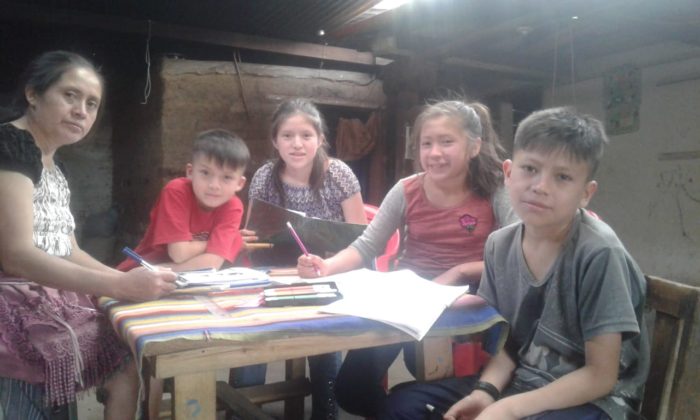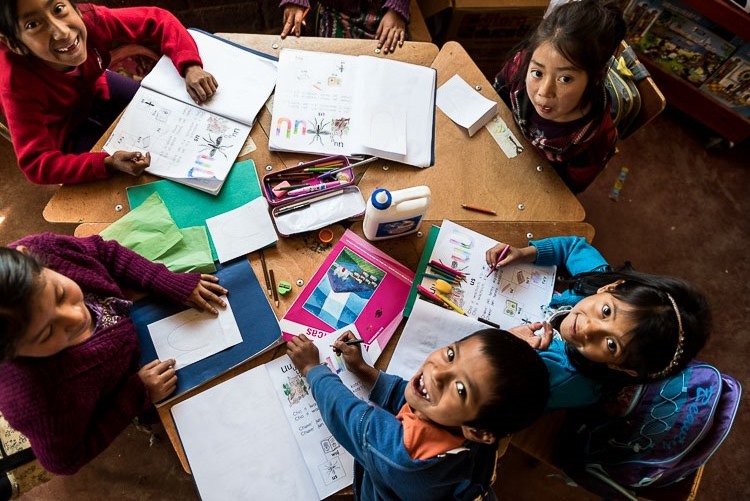Sunset over Guatemala City marks another day of widening inequality and increasing despair as Covid-19 cases continue to rise. With the country’s informal economy taking a huge hit in an already inequitable society, citizens have been taking to the streets waving white flags in a show of desperation and hunger. As The Guardian has reported, nearly 70 per cent of Guatemalans earn a living in the ‘unregulated informal economy’, surviving precariously from hand to mouth.
Indeed, international media outlets have largely picked up on the visible, immediate effects the virus is having on Guatemala (the second most impoverished nation in the Americas) and its citizens. Most famously, in some neighbourhoods, Guatemalans have started hanging colour-coded flags outside of their houses in a bid for help: red means medicines are required, black alerts the authorities to violence and yellow warns that children in the household are in danger. Clearly, too many citizens are facing imminent danger and risk death daily, not only from the virus but from the perilous consequences of rising extreme poverty.
It is hard to imagine what is going on behind the doors of the houses displaying flags. At imminent risk of death and violence, it is easy to forget that countless children are falling severely behind in their learning. A day after Guatemala’s first confirmed COVID case, most students were instructed by their teachers to stay home. As such, many simply are not learning anymore. This is because they have no other option.
Limited Options, Widening Disparities
Some parents in the UK have complained of the challenges associated with home tutoring and online learning that Covid-19 has thrust upon us. Parents in Guatemala are largely without the option to even attempt home learning. As one of my interviewees, a young Guatemalan social activist, Marianella, suggested: ‘Where there are no resources, education has simply not advanced’.
Marianella is particularly concerned about those living in rural areas. ‘It’s hard to believe, but the education of children in rural areas has stagnated as they don’t have access to a TV or internet’. Indeed, a teacher based in Huhuetenango told Plaza Publica that some of his students did not have access to a radio, let alone internet. In San Pedro Necta online learning has not been a plausible solution and schools have divided up the few books they possess amongst homes in local communities.
Juanita, a Guatemalan schoolgirl, explains that her little brothers go to their Aunt’s house each day to follow the Ministry of Education’s lessons aired on TV. ‘My brothers are in primary school and they are keeping up with the Ministry of Education’s #AprendoEnCasa, where lessons are transmitted via a TV channel. For this, my little brothers must go to my Aunt’s house to watch the classes because we don’t have a TV set, like many kids in my village’.

Juanita, herself, is one of the fortunate ones, trying to keep up with her own studies via email to strive for what she describes as ‘a better life’. She and her classmates do struggle with technical difficulties and lost files occasionally. However, many do not have the options those in Juanita’s household enjoy.
This lack of resources is particularly problematic when viewed in the context of an already highly uneven education system. As Jeffery H Marshall wrote in 2018, gains in student achievement being made in rural Guatemalan classrooms have largely been curtailed by low teacher capacity in remote areas.
Juan and Julio, working for Guatemala’s division of the global development NGO, Educo, echoed this to me. Educo focuses on advancing the universal right to receive a quality education. Naturally, Juan and Julio were concerned with how school closures have been impacting an educational context which already faced severe issues pre-pandemic. ‘Nobody was prepared for confinement and homeschooling’, they shared. The experts agreed that even with ‘face-to-face teaching, results were already a worry’.
If we add to this a severe lack of home learning resources in rural neighbourhoods, impoverished parents preoccupied with putting the next meal on the table and a rising number of COVID cases, what will be the consequences?
‘The Most Vulnerable Will Be The Most Affected’
Juan and Julio foresee that ‘the most vulnerable will be the most affected’ in terms of attaining a quality education and, consequently, inequality will grow. Indeed, UNESCO reported in 2007 that, while in urban areas approximately 47.2 per cent of those of secondary school age attend, only 12.7 per cent of their counterparts living in rural areas do so. While rural educational provision has been showing signs of progress, secondary school attendance in urban areas is likely still significantly higher than attendance in rural areas. As students in rural areas struggle to access the resources that some of their urban peers enjoy, it seems plausible that disparities in educational attainment and achievement are widening during the pandemic, especially for children in rural areas and from poorer families.
It is too early to determine the longer term effect that the pandemic will have on school dropout rates generally, and particularly in poorer areas. My interviewees at Educo are particularly worried about this, highlighting a heightened risk of dropout. They shared: ‘There is a danger of dropout and that many students could repeat a vicious circle their mums and dads experienced, of not completing primary school’. They were particularly worried about young girls who may be increasingly impeded by ‘access difficulties or simply by being a woman’.
This concern likely ties into prevailing gender roles in a nation which largely views women as caregivers and men as breadwinners. While educational provision is restricted and disrupted as a result of the pandemic, who is more likely to be prioritised for home-schooling: the future ‘breadwinner’ of the family or ‘the caregiver’ who will more likely perform domestic tasks?
Juan and Julio at Educo observe that it is a particularly worrying time ‘for poor girls who, on top of their school responsibilities, care for their younger siblings and help in the kitchen’. From such a young age many socio-economically disadvantaged Guatemalan school girls face a double burden which is arguably becoming much more of a strain as classrooms are closed and resources are scarce.
This will be a particular worry for the few indigenous girls who have been able to attend school, in spite of impoverishment and social customs. As Wendy Guillermo, a Guatemalteca, herself, observed in 2017, ‘indigenous girls are among the country’s most disadvantaged group with limited schooling, early marriage, frequent childbearing and chronic poverty’. Indeed, of the Two million children in Guatemala who go without schooling, most are indigenous girls living in rural areas. For the privileged few from this category who previously managed to attend classes, the pandemic now bars their access to even a basic education.
Signs of Hope
Perhaps there is some light at the end of the tunnel, despite severely widening inequities. Organisations such as Educo have been promoting hygiene methods, social distancing, the protection of rights and the reformulation of educational projects, to prepare for when schools re-open. They are also ready to offer the Ministry of Education technical support and advice during this tumultuous period and beyond. But how will this crisis shape education in Guatemala long term?
For one of my interviewees based in Guatemala City, temporary home-schooling is highly problematic and almost certainly not something that will continue post-pandemic. She said: ‘I don’t believe that this will change the style of education in Guatemala’. Marianella added that: ‘The majority of parents are highly economically dependent on their jobs so it is difficult to ensure that children are truly developing themselves in this way’, in reference to current home-schooling measures which naturally require a lot of time and energy from already struggling families.
Juan and Julio are a little more optimistic. They emphasize that, with social distancing measures in place, it will be impossible to get everybody back to school at the same time. However, they state that ‘an afternoon shift could be introduced to comply with social distancing’. This would effectively see half of students attending class in the morning, followed by their peers in the afternoon. My interviewees also think that now is the perfect time for a review of the national curriculum to focus more on ‘life skills’, adding that ‘distance learning can be efficient if technology is incorporated as a pedagogical tool with a focus on children’s rights’.
Recovery from this pandemic will provide numerous different avenues for change with a precious chance to reform society and educational structures, giving the marginalised greater opportunities. For now, however, Guatemala faces the imminent pressures of rising coronavirus cases, rising poverty and a population in desperate need of food, hope and the means of filling the void left by empty classrooms.
Katie Jones lived and worked in Mexico as an English teacher in the state of Puebla. Until the Covid-19 pandemic took hold, she was teaching in Costa Rica and was an active member of a local NGO aiming to assist the quality of education for children in an underprivileged barrio. She is the Ambassador for Education for Central America and Mexico for the International Fellowship of Rotarian Educators.

